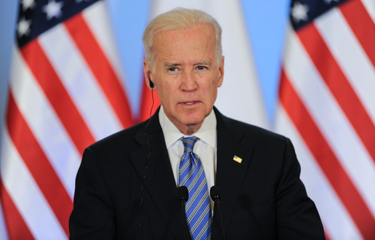The administration of U.S. President Joe Biden has released an action plan to combat human trafficking at home and abroad, an initiative that includes a focus on labor issues in the global seafood industry.
The U.S. Trade Representative National Action Plan to Combat Human Trafficking, released in December 2021, involves better coordination among American agencies as well as with other countries' law enforcement bodies to track and prosecute human trafficking on fishing vessels and in onshore seafood processing facilities. Under the plan, the USTR will ramp up its efforts to encourage other countries to put in place bans on imports of goods made with forced labor.
“Human trafficking is an evil practice that contradicts who we are as Americans and the rights we cherish,” U.S. Homeland Security Advisor and Assistant to the President Liz Sherwood-Randall said in a USTR press release. “With this National Action Plan, we reaffirm our commitment to preventing and punishing human trafficking in all its forms and to addressing the social and economic conditions that can create greater vulnerabilities for marginalized groups.”
John Connelly, the president of U.S. seafood industry trade group National Fisheries Institute, called out labor issues as a top concern for the industry in 2022 in his annual address, released 23 December.
“[We] continue to need to focus on this question of ensuring that we have fair treatment of labor on vessels,” he said. “That’s an issue that we’re going to need to address – it’s out there, it’s going to continue to be out there and we need to continue to work with organizations like [Fairness, Integrity, Safety, Health Standards for Crew] to solve that problem.
In an additional statement sent to SeafoodSource, NFI called on U.S. authorities for increased enforcement as the primary solution to labor violations.
“Keeping unfair labor practices out of the seafood value chain should be a priority and we’re pleased to see the administration taking this responsibility seriously,” NFI said. “For a decade now, NFI has worked to help our members focus on these challenges, but have always noted that the most-important arrow in the quiver is enforcement. Enforcement is purely a law enforcement, regulatory, and government responsibility. It’s not something industry can effectively increase on its own. So any growth in resources associated with it is a positive step.”
While seeing the Biden administration’s move as a good idea veteran seafood industry executive Jerry Knecht – who as owner of North Atlantic Inc. and P.T. Bali Seafood International initiated a worker empowerment initiative – said he fears the move could also push the trade to less-transparent markets like China.
“Backstopping on-the-ground efforts with policy is always a good idea as long as the intent is not lost in the implementation, restricting trade with the unforeseen outcome of shifting trade to countries that maintain a blind eye,” Knecht told SeafoodSource. “Ultimately the best approach, from a policy perspective, would be to create the pain of market restrictions at the national level country by country. An example is how Thailand was restricted in trade with the E.U. around IUU. This approach has the best chance of bringing top-down pressure on opaque and localized situations.”
Knecht said technology, rather than governmental policy or NGO intervention, could be the best solution for eliminating labor abuses in the seafood supply chain.
“Tracking technology is [currently] restricted to electronic signatures followed by commercial satellite. This C-level technology when compared to heat and light signatures is very blind,” he said. “At the moment, it seems these A- and B-level technologies are the domain of the military. If or when [these are] employed, there will no longer be any place to hide for any vessel on any ocean. As in all things, transparency equals accountability. This is a more-effective place for U.S. efforts at mitigation to be focused.”
Beth Lowell, the deputy vice president for U.S. campaigns at environmental non-governmental organization Oceana, said the European Union, which has similar requirements for its seafood imports, and the United States have outsized power to drive change in seafood labor standards, as together they account for nearly 50 percent of global seafood imports.
“Closing markets to IUU fishing will drive changes on the water as fleets must be able to demonstrate their catch was legally sourced,” Lowell told SeafoodSource.
Lowell praised the U.S. Seafood Import Monitoring Program for taking a step in this direction, and Oceana began calling for its expansion in March 2021.
“As a major seafood importer, the United States can set the minimum standards that seafood must meet to enter the U.S. market, specifically requiring the seafood we import to be legally caught and honestly labelled. [SIMP] applies to 13 species groups, about 40 percent of the seafood we import. This program requires that seafood imports have catch documentation, providing more information about the origin of the catch and recordkeeping requirements for traceability,” Lowell said. “If SIMP were expanded to all seafood … any seafood imported to the U.S. would require catch documentation and be traced to the point of origin.”
However, Lowell said she worried how effective any clampdown on forced labor violations will have if the biggest market for seafood – China – does not take any enforcement action of their own. In fact, since the imposition of recent U.S. sanctions against Chinese fishing companies on the grounds of suspected illegal, unreported, and unregulated (IUU) fishing and labor abuses, China has reacted defensively. The U.S. actions have been portrayed in the Chinese media as a form of American protectionism aimed against Chinese goods. China reacted similarly to block the U.S. introduction of text into the draft agreement being negotiated at the World Trade Organization to end harmful fishery subsidies.
Labor campaigners in Taiwan, a U.S. ally but also a country with a history of alleged labor abuses in its fisheries sector, have welcomed the leverage they see the Biden administration’s plan bringing to bear.
“The White House action plan sends out a clear message – combating forced labor and human trafficking requires international efforts, especially in industries like fishery where supervision and grievance mechanism are still inadequate,” said Yuton Lee, a campaigner at Greenpeace in Taiwan. He told SeafoodSource his organization welcomes the emphasis on international cooperation in the Biden administration’s plan.
“However, this approach will only succeed when large fishing economies, such as Taiwan, are involved and are willing to cooperate,” he said.
The Taiwanese government continues to “allow labor exploitation happening under its watch, and key players in the industry such as [fishing firm] FCF must assure consumers they are not profiting from modern slavery on the high seas,” Lee said.
Photo courtesy of Fotophoto/Shutterstock







